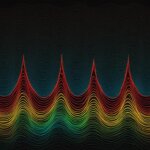Table of Contents
If you’ve ever wondered how the frequency of an event is measured, you’ve likely come across the term ‘hertz.’ Hertz is the unit used to define the frequency of periodic events such as waves, oscillations, and vibrations. It is named after Heinrich Hertz, the German physicist who first proved the existence of electromagnetic waves in the late 19th century.
Put simply, hertz is a measure of how often something happens in a second. For example, if a sound wave oscillates at a frequency of 50 hertz (50 oscillations per second), then the sound is produced 50 times per second. In this section, we will explore the concept of hertz, its definition, and its significance across various applications.
Key Takeaways
- The unit of frequency is hertz, named after Heinrich Hertz, a German physicist.
- Hertz measures how often something happens in a second.
- Understanding hertz is important in troubleshooting electronic devices, optimizing wireless communication, and conducting scientific experiments.
- Hertz plays a role in everyday life, such as in music and audio systems.
- Hertz is widely used in various fields, including telecommunications, electronics, and physics.
The Definition and Application of Hertz
Definition of Hertz: Hertz is a unit used to measure frequency, which refers to the rate of periodic events per second.
In simple terms, hertz is the number of cycles per second that an event, such as a sound wave or oscillation, occurs. It is named after Heinrich Hertz, the German physicist who discovered electromagnetic waves.
Application of Hertz: The concept of hertz has practical applications in various fields. In electronics, hertz is used to measure the frequency of alternating current (AC) power supply, which is crucial for designing and troubleshooting electrical devices.
In telecommunications, hertz plays a crucial role in wireless communication. Radio waves, which are used to transmit wireless signals, have different frequencies measured in hertz. By knowing the frequency of radio waves, we can determine the suitable frequency band for transmitting signals without interference.
In physics, hertz is used to describe the frequency of waves, such as light waves and sound waves. Understanding the frequency of waves is essential for conducting scientific experiments and analyzing findings.
“Hertz is a fundamental unit of measurement in science and technology, providing a common language for measuring and analyzing frequency.”
The table below shows some examples of common frequencies measured in hertz:
| Frequency | Description |
|---|---|
| 20Hz-20kHz | The audible range of human hearing |
| 50Hz-60Hz | The frequency of AC power supply in most countries |
| 2.4 GHz-5GHz | The frequency band used for Wi-Fi and Bluetooth communication |
| 430 THz-750 THz | The visible light spectrum |
Understanding the concept of hertz and its practical applications can help us to navigate and optimize various aspects of technology and science.
The Importance of Understanding Hertz
Having a clear understanding of hertz is of utmost importance in different contexts. In this section, we will discuss how it contributes to troubleshooting electronic devices, optimizing wireless communication, and conducting scientific experiments. With a better grasp of hertz, we can interpret implications and make informed decisions in various technical fields.
Troubleshooting Electronic Devices
Hertz plays a crucial role in analyzing and repairing electronic devices. Understanding hertz is essential for anyone who has been involved in fixing electronic equipment. In technical terms, hertz measures the frequency of an alternating current (AC). By knowing the frequency of an AC power supply, technicians can determine the root cause of a fault and restore the device’s functionality.
Optimizing Wireless Communication
Hertz is also vital for optimizing wireless communication. Different types of wireless systems operate at different frequencies, including Wi-Fi, cellular networks, and radio stations. Choosing the right frequency band depends on the specific application and the surrounding environment. By understanding hertz, engineers and technicians can enhance wireless communication systems’ efficiency and reliability.
Conducting Scientific Experiments
Hertz is an integral part of scientific experimentation. The frequency at which periodic events occur is essential in the fields of physics, chemistry, and biology. Hertz is particularly crucial for analyzing properties of light and sound waves, such as wavelength and frequency. Without a solid grasp of hertz, it is impossible to interpret the results of experiments and draw meaningful conclusions.
The Role of Hertz in Everyday Life
Hertz also plays a significant role in everyday life, particularly in music and audio systems. The frequency of a sound wave is measured in hertz, and a sound’s quality and pitch depend on its frequency. For example, high-frequency sounds produce a sharp, whistling sound, while low-frequency sounds create a deep and resonant bass sound. By understanding hertz, we can develop a better appreciation of music and other audio-related technologies.
The Conclusion
In conclusion, understanding hertz is crucial in various fields of study and applications. The concept of hertz, as a unit of frequency, defines the rate at which periodic events occur. It has significant implications in technology and science, particularly in telecommunications, electronics, and physics.
Furthermore, having knowledge of hertz can aid in troubleshooting electronic devices, optimizing wireless communication, and conducting scientific experiments. It also plays a role in everyday life, such as in music and audio systems.
Therefore, it is essential to comprehend the definition, application, and importance of hertz to maximize its potential uses and benefits. By doing so, we can gain a comprehensive understanding of the world around us and improve our lives through the implementation of technology and science.
FAQ
What is hertz?
Hertz is the unit used to measure frequency. It defines the rate at which periodic events occur.
How is hertz used in different fields?
Hertz has various practical applications in fields such as telecommunications, electronics, and physics. It is used to measure the frequency of signals, waves, and vibrations in these areas.
Why is it important to understand hertz?
Understanding hertz is crucial for troubleshooting electronic devices, optimizing wireless communication, and conducting scientific experiments. It helps in identifying the frequency of events and their impact on the performance of systems.
Can hertz be applied in everyday life?
Yes, hertz plays a role in everyday life, particularly in music and audio systems. It helps in determining the frequency range of sound waves and optimizing the quality of audio output.
How does understanding hertz benefit us?
By grasping the concept of hertz, we gain a comprehensive understanding of the rate at which periodic events occur. This knowledge is valuable in troubleshooting, optimizing communication, and enhancing our scientific understanding of the world.












